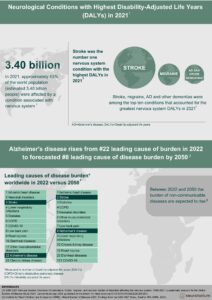Nearly 1 billion people suffer from migraine. In 2021, The Brain Prize – the world’s largest brain research prize – was awarded to Professors Lars Edvinsson, Peter Goadsby, Michael Moskowitz and Jes Olesen for their ground-breaking work on the causes and treatment of migraine.
Neurotorium and The Brain Prize collaborate on making this exceptional research available to clinicians who are working with matters of the brain in their daily lives.
In this documentary film, developed by the team behind The Brain Prize at the Lundbeck Foundation, you can learn more about migraine and the research that led to the brain prize in 2021, and you hear from a patient who suffers from the rarer condition of chronic migraine.




